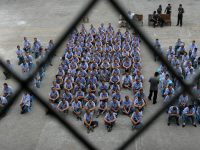Largest Prison Strike in US History: An Exclusive Interview with Azzurra Crispino

The largest prison strike in US history is in its third week. But you may not know it, as for the most part, the mainstream media in the States has been ignoring this unprecedented action.
Tens of thousands of inmates from over 40 prisons across 24 US states joined together on September 9 in a coordinated protest to bring about an end to free prison labour. Today, the strikes are continuing within 20 prisons in at least 11 states.
Coordinated action
Months of planning went into the work stoppages, as inmates nationwide communicated via an underground network of smuggled mobile phones and social media.
With help from outside, a call to action announcing the objectives of the strike was distributed both inside and outside of prisons.
Organised prisoners’ rights groups were instrumental in coordinating the strikes in each state. These include the Free Alabama Movement, the End Prison Slavery in Texas Movement and the Free Ohio Movement.
Prisoner demands
Inmates stopped work over a range of issues, including overcrowding, lack of education and healthcare, the overuse of solitary confinement and physical mistreatment by prison staff.
But the overriding aim of the movement is to bring about a halt to forced prison labour, which they say amounts to modern day slavery.
Prisoners are specifically calling for the repeal of an exception found within the 13th Amendment to the US Constitution.
The Amendment brought an end to slavery and involuntary servitude, except as a punishment for a person who has been convicted of a crime.
Mass incarceration
More than 2.3 million people in the US are currently incarcerated. The nation’s prison-industrial complex is a $2 billion a year industry that employs around 900,000 prisoners.
Many of these inmates are paid as little as 12 to 40 cents an hour, while in some states like Texas, they’re paid nothing at all.
The Attica Uprising
September 9 – the day the strike began – was significant as it marked the 45th anniversary of the Attica Prison Uprising.
One thousand inmates seized control of the Attica Correctional Facility in New York, in response to the killing of prison rights activist George Jackson. Four days later, the authorities brutally took back the prison.
The Incarcerated Workers Organizing Committee (IWOC) is one of the main organising groups behind the current campaign, producing the call to action that was distributed amongst inmates.
Sydney Criminal Lawyers® spoke with Azzurra Crispino, media co-chair of IWOC, to gain a deeper understanding of the current situation.
What is the Incarcerated Workers Organizing Committee?
In 2014, members of Free Alabama Movement began the conversation with the Industrial Workers of the World (IWW), and out of that the decision was made to create the way for prisoners to join the IWW and unionise, as a way towards a national and an international work strike.
The Incarcerated Workers Organizing Committee is the prisoners and non-incarcerated workers who support prison abolition. So you don’t necessarily have to be a member of the IWW to be a member of IWOC if you’re on the outside.
IWOC understand there are prisoners who don’t want to run the risk of being on our roll. We have a membership of about 900 prisoners but we know that tens of thousands engaged in strike action on September 9.
You mentioned the Free Alabama Movement. Who are they?
That’s the statewide organising committee for Alabama prisoners. They have issued the Freedom Bill that would end prison slavery in Alabama and force decarceration in the state of Alabama.
You use the term decarceration?
Yes. So IWOC is an explicitly prison abolition organisation. We want to see an end to prisons, period.
We also recognise that there are steps that need to be taken. The Freedom Bill would basically have every inmate have to go up for parole again with an independent parole board. It would limit the amount of inmates that can be in Alabama without allowing them to be shipped out anywhere else.
It would accept that certain facilities have to be shut down because they’re too old and structurally unsound. And it would work towards massive decarceration.
That bill would require an amendment at the state level, saying that the 13th Amendment no longer requires the exception for prisoners.
The 13th Constitutional Amendment, most people believe, abolished slavery, but it didn’t. It said that if you were convicted of a crime, you could still be conscripted to work.
And so one of the major calls of the national strike has been to end prison slavery.
The largest prison strike in history is taking place right now. How did it begin?
There have been work stoppages earlier this year in Alabama and Texas. Georgia had some pretty serious strike action occurring last year. Obviously there were the Pelican Bay hunger strikes in California which led to a pretty massive shift to how solitary confinement occurs in that state. So there’s been a lot of uprisings going on.
But if we can go back to Attica for a moment, 45 years ago, the assassination of George Jackson was what kicked off that uprising. One of the reasons why George Jackson was killed was that he had been calling for a prisoner union and for a national prison strike.
So this is a tactic, a conversation and a strategy that’s been a part of prisoner resistance since before I was born.
But the Free Alabama Movement has been calling for strikes really persistently. So they had a strike earlier this year and then said we want a national strike on the 45th anniversary of Attica.
That’s when they created the document called Let the Crops Lie in the Field and then IWOC began distributing that to all of our inside members and helping to support the coalition.
I want to make clear that we shouldn’t get anywhere near all the credit. Just about every state where there’s been strike action, there’s a state organisation that has been supporting the prisoners. There’s a long list of organisations.
But what the IWW has been able to bring to the table is that everybody knows who we are, so when the IWW says we are supporting the strike it’s been easier for us to get media attention, funding and to help coordinate the response to the strike, just because we’ve been in existence since 1890.
What’s actually going on in prisons during the strikes?
That depends from unit to unit and from state to state. In some states it’s been partial work stoppages, so you might have a few workers, who lay it down. For example, in Washington State there was a women’s facility where a few women refused to work in the library and they were taken to solitary confinement.
Resistance might look like a partial work stoppage, maybe a handful of people who strike. Or like in Holman facility in Alabama you had every single prisoner who does a prison job refuse to work. So that’s what we would call a full work stoppage.
And obviously things can go in between, like in Kinross Unit in Michigan you had 400 prisoners who marched through the yard on September 9.
Then you have the hunger strikes. For example, in Wisconsin you have a hunger strike that preceded the main one but it intensified on September 9. That crew is dying to live and their major demand is an end to administrative segregation and long term solitary confinement. Their hunger strike has been going on for more than a hundred days now.
How are the authorities reacting?
A lot of denial. I mean, they’re just straight up denying any strike action is occurring in a lot of situations, and so far there hasn’t really been any giving in to demands. But I know three weeks is a long time for those of us on the outside but for prisoner, time that’s a blip.
So your committee describes itself as abolitionist. What does that mean in essence?
An end to prison. So we want to see a focus on reformist justice, rehabilitative systems and transformative justice. Whether that means community based drug rehabilitation instead of incarceration, or conflict resolution that happens within the community.
For example, my day job is that I’m an associate professor of philosophy at Boston Community College. I just took a paper to conference talking about rape and what we should do instead of incarceration. It basically focused on this idea that we can’t unrape the person who has been raped.
Instead, we should be focusing on how can we transform the situation. My ideal would be that a person who has committed a sexual assault would receive intense therapy and once they have received the healing from whatever problem it is that led them to do such a thing in the first place, then they might go into the community and as penance talk to people.
So it’s non-violent communication and non-violent conflict resolution training. And I don’t want to see a hospital that becomes a prison, we want to see an end to prisons by any means.
Would you say that’s the main aim of the strikes at present?
I think all prisoners want to be free. I don’t think that that’s a controversial claim to make. I think a lot of people are concerned about what do we do instead and that’s why in the Freedom Bill you see a focus on let’s start with non-violent drug offenders. Let’s get those people into rehab.
We want to focus on a move away from punishment. Right now our system says, “When you have done something wrong that means that you are wrong and you need to go away to where the people who are wrong are.”
We think that the way to fix the problem is to say to somebody who has done wrong, “You made a mistake and this is what you need to do in order to do right in the future.”
How would you describe the current state of incarceration in the United States?
We incarcerate more people than any other country in the world. That’s not per capita, that’s straight out.
It’s incredibly racist in terms of who ends up incarcerated and incredibly sexist in terms of who gets incarcerated.
So if you look at the war on drugs for example, 90 percent of those who end up incarcerated for drug crimes are male. We know perfectly well that men and women use drugs at roughly the same rate.
And it’s incredibly racist, even if you take into consideration the crack cocaine disparity that President Obama kind of did something about, it still doesn’t explain why so many African Americans and Hispanics end up incarcerated compared to white people.
But it does make sense if you think of it in terms of a system of exploitation. So what would our unemployment figures look like if we included prisoners?
And it’s been interesting that we’ve had a lot of support from industrial unions because they’re recognising that they can’t compete against prison labour. In Texas, prisoners are not required to be paid any wage at all. But they’re working in manufacturing. They’re working in the agricultural sector.
If you’re trying to compete, whether it’s for a garment job or you want to make licence plates for example, how can you compete with prison labour that gets paid nothing?
There’s been a lack of coverage of the strike in the US mainstream media. Why do you think that is?
I think the corporations that hire prison labour often invest heavily in advertising and I think there’s some pressure there from the editorial boards not to cover the stories.
I also think because we’re asking for a really radical shift in how we deal with incarceration and I think that this is a story a lot of media doesn’t want to touch, because they don’t even want to talk about prison abolition.
And lastly, you’re in your third week, with thousands still striking. What’s the next step from here?
Certainly at this point, we’re going to continue supporting the prisoners that continue to strike. Whether that’s a work stoppage or a hunger strike, those people need to continue to be supported.
From there I think it’s going to be education and regroup, looking at legal options, like law suits or freedom of information act requests, and continuing to explore all of those avenues. Consolidating a lot of the new activists both on the inside and the outside that have joined the struggle and then ultimately launching another set of strikes.
Azzurra thank you very much for taking the time out to speak with us. And a big shout out of solidarity to you all.
Oh thank you, we really appreciate it.
Click here for more exclusive interviews with leaders in criminal and social justice reform.
Image credit: Counter Current News






